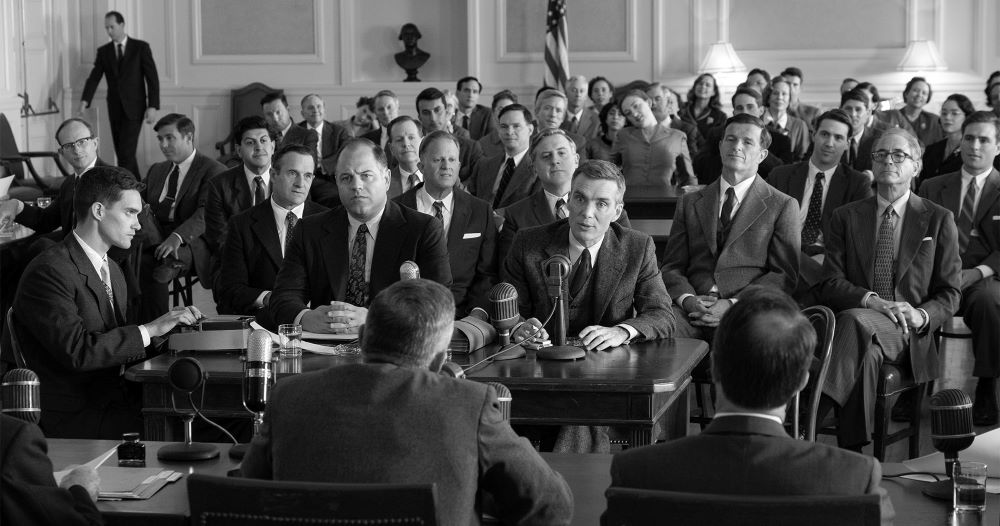
Cillian Murphy plays plays J. Robert Oppenheimer, the theoretical physicist who directed the Los Alamos Laboratory, which created the atomic bomb. In "Oppenheimer," which opened July 21. After the first test bomb, Oppenhiemer said he thought, "Now I am become death, the destroyer of worlds." (Courtesy of Universal Pictures)
Anti-nuclear weapons activists are cautiously optimistic that the recently released blockbuster film, "Oppenheimer," could spark greater interest in a moral examination of U.S. nuclear weapons policies, if not a larger national discussion. Such a discussion, they say, is long overdue.
Having worked for decades to cast more light on the terrifying power and catastrophic impacts of nuclear weapons, some activists see the film as an unprecedented opportunity. Never before have nuclear weapons related issues been seriously presented in a film before a global audience.
The budget for "Oppenheimer" is estimated at $100 to $135 million. This makes it one of the most expensive biographical films ever made.
But the cautious optimism the film might stir a national moral appears fragile. It faces formidable vested financial and political interests. Meanwhile, the biggest challenge might simply be overcoming widespread indifference, complacency and willful ignorance. The U.S. public seems not to care — or, at least, not to care enough to force their leaders to change course — even as the current road increases the risks of a global nuclear war.
"Ignorance is bliss," my father taught me. As a young child, I could not fully understand his words. As I grew into adulthood I began to better understand what he was trying to convey. The phrase can be traced back to an 18th-century English poet Thomas Gray, and the poem "Ode on a Distant Prospect of Eton College." The full line is: "Where ignorance is bliss, 'tis folly to be wise."
The words suggest that being unaware, or ignorant, can lead to happiness, as knowledge can bring discomfort, worry or distress. Yet the phrase appears to carry a more subtle message, one especially pertinent to these times: Bliss might really involve willful ignorance.
Today's complacency toward nuclear weapons, including their continued creation and stockpiling, is easily exploited. This is especially true when much of the information is scientific in nature. What does the public really know about the explosive force of nuclear fission? Or the complexities of safely maintaining nuclear weapons stockpiles when components are kept on hair trigger alert? Or the lethal effects of lingering atmospheric radiation following a nuclear weapons exchange? Or the link between global radiation and nuclear winter? The list could go on.
Vested well-monied interests work to perpetuate the nuclear weapons arms race. Billions of dollars are at stake. Meanwhile, the popular media rarely discuss the U.S. military budget. If all goes according to plan, the U.S. will spend $634 billion on new nuclear weapons and deployment systems by the end of this decade, an average of more than $60 billion annually, according to the Congressional Budget Office.

Cillian Murphy, center, is seen in a scene from "Oppenheimer." Some faith-based anti-nuclear organizations hope the new film will spark a moral examination of U.S. nuclear weapons policies. (Courtesy of Universal Pictures)
Forty years ago, the U.S. Conference of Catholic Bishops published a pastoral letter on war and peace called "The Challenge of Peace: God's Promise and Our Response." In the letter, the bishops offered what they called "a strictly conditioned moral acceptance of deterrence," but only as a "step on the way toward a progressive disarmament." Some $60 billion annually does not look much like progressive disarmament.
Pope Francis has been more forthright. He has condemned the use and even the possession of nuclear weapons. "If we also take into account the risk of an accidental detonation as a result of error of any kind, the threat of their use, as well as their very possession, is to be firmly condemned," he told a gathering at the Vatican in December 2017.
Some peace activists have expressed disappointment that the Oppenheimer film does not adequately deal with the suffering and death the August 1945 atomic bombs caused in Hiroshima and Nagasaki. Others have expressed concern that the film's focus on scientific achievement could overshadow the true horror of nuclear weapons. Yet they are buoyed by the film's spellbinding and compelling portrayal of the science behind the bomb and the moral issues its creation raised.
The New York Times' chief film critic, Manohla Dargis, answers some criticisms, writing:
François Truffaut [a French film critic] once wrote that "war films, even pacifist, even the best, willingly or not, glorify war and render it in some way attractive." This, I think, gets at why Nolan refuses to show the bombing of Hiroshima and Nagasaki, world-defining events that eventually killed an estimated 100,000 to upward of 200,000 souls. You do, though, see Oppenheimer watch the first test bomb and, critically, you also hear the famous words that he said crossed his mind as the mushroom cloud rose: "Now I am become death, the destroyer of worlds."
ICAN, the Geneva-based nonprofit organization, which won the 2017 Nobel Peace Prize for its anti-nuclear weapons efforts, has helped set the stage for such a widespread discussion. Well before the film opened, it published a Campaigners' Action Kit. The kit states ICAN (the International Campaign to Abolish Nuclear Weapons) hopes the film will create "an opportunity to spark public attention on the risks of nuclear weapons."
It addresses what ICAN states is the central myth about nuclear weapons, a myth that has lulled the public into its complacency, the belief that the worst nuclear weapons threats are well behind us, that the nuclear arms race is somehow being safely managed.
Not the case, ICAN states, pointing out that even before the war in Ukraine began — and Russian President Vladimir Putin began threatening the use of nuclear weapons — the United Nations was warning "the risk that nuclear weapons will be used is higher now than at any point since the duck-and-cover drills and fallout shelters of the Cold War."
Ploughshares Fund, a public grantmaking foundation that supports initiatives to prevent the spread and use of nuclear weapons, is funding the hosting of a series of private "Oppenhiemer" screenings in U.S. cities, including Denver, San Francisco, Los Angeles, Santa Fe, Washington, D.C., and Chicago. These screenings will be accompanied by panel discussions exploring the history of the harm caused by nuclear weapons, the policies that drive their purpose and the implications of their existence. The screenings have been organized by Aligning Action, a partnership of 43 organizations engaged in nuclear threat reduction and disarmament efforts.
Advertisement
Anne Sullentrop, vice president of PeaceWorks Kansas City, recently returned from Los Alamos, New Mexico, where she participated in an annual prayer service July 16 marking the anniversary of the first atomic explosion. She hosted a discussion of the Oppenheimer film before a July 23 showing at the Glenwood Arts Theater in Leawood, Kansas.
"The bomb test that you'll see," Sullentrop told the audience before the show, "contaminated 46 states, was a 7-mile-high explosion, and turned the desert into radioactive green glass."
She maintains she is cautiously optimistic nuclear weapons can be banned. She points out there are now some 92 signatories and 68 states parties to the United Nations Treaty on the Prohibition of Nuclear Weapons, which prohibits the development, testing, production, possession, transfer, use and threat of use of nuclear weapons. The treaty was adopted by the U.N. General Assembly on July 7, 2017, and entered into force on Jan. 22, 2021.
Since 1990, Sullentrop has been part of a group that has traveled each July 16 to the Trinity site in the New Mexico desert to vigil and pray.
"Our prayer was for the miraculous power of God to bestow on all humanity … the grace of forgiveness for the evil of creating the Atomic Bomb and for protection from the multiplicity of evils in which it has immersed humanity," she wrote in an email. "We pray with Mary, Our Lady of Mt. Carmel, whose universal feast day is July 16 and at whose request Jesus performed His first miracle in the Gospels."
Will it take a miracle to rid the world of nuclear weapons before they rid the world of us? A related question: Might the Oppenhiemer film be part of that miracle?








